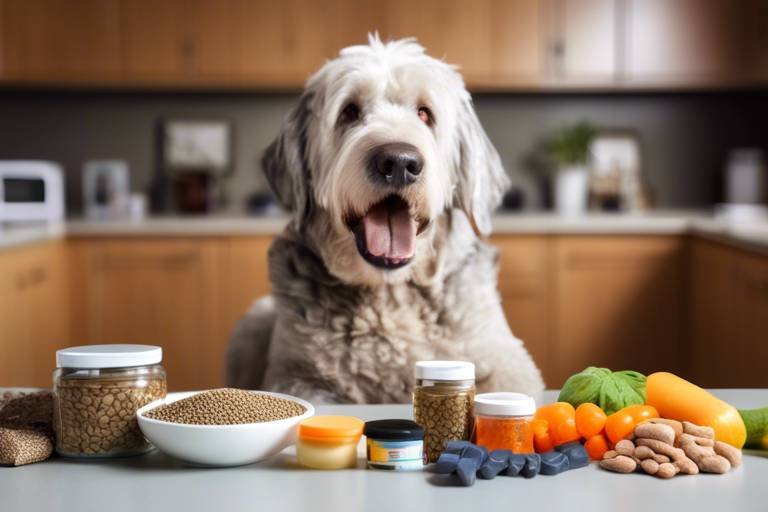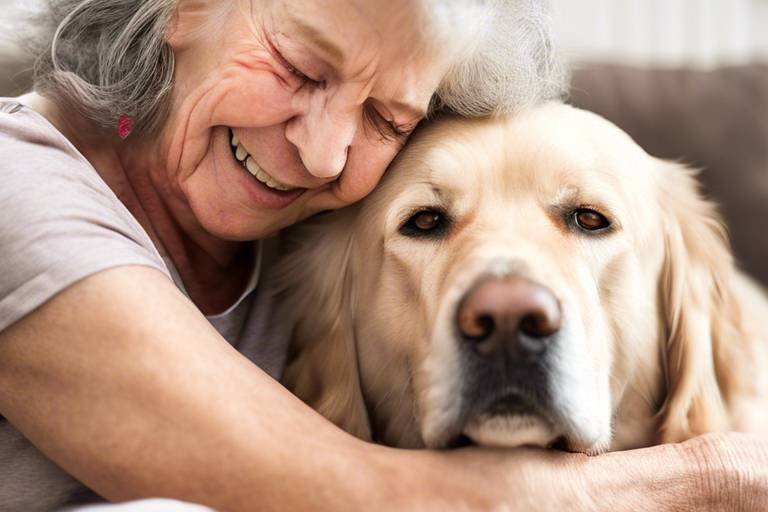The Best Foods for Senior Dogs - What to Look For
As our furry companions age, their nutritional needs change significantly. Just like humans, senior dogs require a diet that caters to their specific health needs, ensuring they remain vibrant and active in their golden years. It's essential to understand that what worked for them in their younger days may not suffice now. So, how do we navigate the vast sea of dog food options available today? In this article, we'll delve into the essential nutritional elements that senior dogs need, discuss the benefits of specialized diets, and offer practical tips on selecting the best food options to enhance their health and well-being.
Understanding the unique nutritional requirements of senior dogs is crucial for their health. As dogs age, their metabolism slows down, and they may become less active, leading to weight gain and other health issues. Therefore, it's vital to focus on a diet that supports their aging bodies. Key nutrients such as high-quality protein, healthy fats, fiber, vitamins, and minerals play a significant role in maintaining optimal health. For instance, protein helps preserve muscle mass, while fiber aids digestion and helps maintain a healthy weight. Furthermore, antioxidants from fruits and vegetables can combat oxidative stress, which is prevalent in older dogs. By paying attention to these essential nutrients, you can help ensure your senior dog remains healthy and happy.
Selecting food with high-quality ingredients is vital for senior dogs. When browsing through dog food labels, look for real meat as the first ingredient, as it indicates a higher protein content. Additionally, healthy fats, such as omega-3 fatty acids, are crucial for promoting a shiny coat and healthy skin. Carbohydrates should come from wholesome sources like sweet potatoes or brown rice, providing energy without unnecessary fillers. Remember, not all dog foods are created equal. Some may contain artificial additives and low-quality fillers that offer little nutritional value. To help you make informed choices, here’s a quick guide on what to look for:
| Ingredient Type | What to Look For |
|---|---|
| Protein | Real meat (chicken, beef, fish) as the first ingredient |
| Fats | Healthy fats (omega-3 and omega-6 fatty acids) |
| Carbohydrates | Whole grains or vegetables (brown rice, sweet potatoes) |
| Vitamins & Minerals | Natural sources (fruits and vegetables) for antioxidants |
Protein is essential for maintaining muscle mass in senior dogs. As they age, dogs can experience a natural decline in muscle mass, making it imperative to provide them with adequate protein. High-quality protein sources, such as chicken, turkey, fish, and lamb, not only support muscle maintenance but also contribute to overall health and vitality. These proteins contain essential amino acids that are critical for various bodily functions, including immune response and tissue repair. So, when choosing a food for your senior dog, prioritize those that boast high protein content from reputable sources.
When it comes to protein sources, a common question arises: should you opt for animal-based proteins or plant-based options? Animal proteins are generally more complete, providing all essential amino acids necessary for your dog's health. However, incorporating plant proteins can also be beneficial, especially for dogs with specific dietary restrictions or allergies. A balanced approach, where both types of proteins are included, can offer a well-rounded diet. Think of it as a delicious buffet where your dog can enjoy the best of both worlds!
Different breeds have varying protein needs. For instance, a large breed dog may require more protein than a small breed to support their muscle mass and overall health. It's essential to determine the right protein intake based on your dog's size, breed, and activity level. If your senior dog is still quite active, they may need a higher protein diet compared to a more sedentary dog. Consulting with your veterinarian can help you tailor their nutrition to ensure they receive the right amount of protein for their specific needs.
Healthy fats play a significant role in a senior dog's diet. These fats are not just a source of energy; they also support skin and coat health, as well as brain function. Omega-3 and omega-6 fatty acids, often found in fish oil and flaxseed, can help reduce inflammation and promote a healthy heart. Including these fats in your senior dog's diet can make a world of difference in their overall well-being. Think of it as giving them a little extra love in their food!
While it's crucial to know what to include in your senior dog's diet, it's equally important to be aware of what to avoid. Certain ingredients can be harmful to senior dogs, potentially leading to health issues. For instance, artificial preservatives, fillers, and low-quality grains can negatively impact their health. By steering clear of these ingredients, you can promote better health and prevent potential health issues in aging pets.
Artificial preservatives can pose health risks to senior dogs. These additives may lead to allergies, digestive issues, and even more severe health problems over time. Instead, look for foods that use natural preservatives, such as tocopherols (vitamin E) or ascorbic acid (vitamin C). These alternatives not only keep the food fresh but also provide additional health benefits. By choosing natural options, you're ensuring your senior dog enjoys a healthier diet without unnecessary risks.
Grains and fillers may not provide adequate nutrition for senior dogs. While some dogs can handle grains well, others may have sensitivities or allergies that can lead to digestive discomfort. It's essential to explore the pros and cons of grains in dog food and consider grain-free options when appropriate. For many senior dogs, a diet rich in protein and healthy fats, with minimal fillers, can lead to improved health and vitality. Think of it as cleaning out the pantry—removing the unnecessary clutter allows your senior dog to thrive!
1. How can I tell if my senior dog is getting the right nutrition?
Look for signs such as a shiny coat, healthy skin, and consistent energy levels. Regular vet check-ups can also help assess their nutritional needs.
2. Should I switch my senior dog to a special diet?
Yes, many dog food brands offer specialized diets for senior dogs that cater to their unique nutritional needs. Consult your vet for recommendations.
3. How often should I feed my senior dog?
Feeding schedules can vary. Some senior dogs do well with two meals a day, while others may benefit from smaller, more frequent meals. Monitor their weight and adjust accordingly.
4. Are homemade diets better for senior dogs?
Homemade diets can be beneficial, but they require careful planning to ensure they meet all nutritional requirements. Always consult with a vet before making any significant changes.

Nutritional Needs of Senior Dogs
Understanding the unique nutritional requirements of senior dogs is crucial for their health and longevity. As our furry friends age, their bodies undergo various changes, affecting their metabolism, energy levels, and overall health. Just like we need different nutrients as we grow older, senior dogs require a tailored diet to support their aging bodies. This means focusing on high-quality ingredients that cater to their specific needs.
First and foremost, senior dogs need a balanced diet rich in essential nutrients. These include proteins, fats, carbohydrates, vitamins, and minerals. Each of these plays a significant role in keeping your dog healthy and active. For instance, proteins are crucial for maintaining muscle mass, which tends to decline as dogs age. On the other hand, healthy fats are vital for skin and coat health, while carbohydrates provide the energy needed for daily activities.
Moreover, the digestibility of food becomes increasingly important as dogs age. Senior dogs often have a more sensitive digestive system, so choosing easily digestible ingredients can help prevent gastrointestinal issues. Look for foods that contain prebiotics and probiotics, which can aid in digestion and promote a healthy gut. Additionally, senior dogs may benefit from foods fortified with antioxidants, which help combat the effects of aging by reducing inflammation and supporting immune function.
It’s also essential to monitor your senior dog's weight. Many dogs become less active as they age, leading to weight gain if their caloric intake isn't adjusted accordingly. Providing a diet that is lower in calories but still rich in nutrients can help maintain a healthy weight. This means paying attention to the caloric density of the food you choose, ensuring it meets your dog's needs without unnecessary fillers.
In summary, the nutritional needs of senior dogs are multifaceted and require careful consideration. By focusing on high-quality, easily digestible ingredients that provide balanced nutrition, you can help your aging dog live a healthier, happier life. Remember, it’s always a good idea to consult with your veterinarian to determine the best dietary plan tailored specifically for your senior dog’s unique needs.

Choosing High-Quality Ingredients
When it comes to feeding our beloved senior dogs, the importance of high-quality ingredients cannot be overstated. As our furry friends age, their bodies undergo numerous changes, and their dietary needs shift accordingly. Choosing the right food can significantly impact their health, energy levels, and overall well-being. So, what should you be looking for in the ingredient list? Let’s dive into the key components that make up a nutritious diet for senior dogs.
First and foremost, protein is a crucial element. Older dogs require sufficient protein to maintain their muscle mass, which naturally declines with age. Look for dog foods that list a high-quality source of protein as the first ingredient, such as chicken, beef, or fish. Not only does this support their muscle health, but it also contributes to a shiny coat and healthy skin. Remember, not all proteins are created equal, and the source matters a lot!
Next up, we have healthy fats. These are essential for maintaining energy levels and supporting brain health in senior dogs. Fats also play a vital role in keeping their skin moisturized and their coat shiny. Omega-3 and Omega-6 fatty acids are particularly beneficial, so keep an eye out for ingredients like fish oil or flaxseed oil in the food you choose. Not only will these fats help with physical health, but they can also improve cognitive function, which is crucial for aging dogs.
Then, we cannot ignore the role of carbohydrates. While some may argue that dogs are primarily carnivores, carbohydrates provide necessary energy and fiber, which aids in digestion. Opt for whole grains like brown rice or oats, or consider grain-free options if your dog has sensitivities. Remember, the key is to ensure that the carbs come from quality sources that provide more than just empty calories.
Now, let’s discuss the importance of vitamins and minerals. A well-rounded diet for senior dogs should include a variety of essential nutrients to support their immune system and overall health. Look for foods that contain natural sources of vitamins, such as fruits and vegetables. Ingredients like blueberries, spinach, and sweet potatoes are not only tasty but also packed with antioxidants that combat aging effects.
To summarize, here are the key components to look for when choosing high-quality ingredients for your senior dog:
- High-quality protein sources
- Healthy fats (Omega-3 and Omega-6)
- Whole grains or grain-free options
- Fruits and vegetables for vitamins and minerals
By focusing on these components, you can ensure that the food you choose for your senior dog is not only nutritious but also tailored to meet their specific needs. Remember, you are what you eat, and this holds true for our canine companions as well. Investing time in understanding and selecting high-quality ingredients will pay off in the form of a happy, healthy, and energetic senior dog!
Protein Sources
When it comes to feeding our beloved senior dogs, protein is a crucial component that shouldn't be overlooked. As dogs age, they naturally lose muscle mass, which can lead to a decline in their overall health and mobility. This is where the right protein sources come into play. Think of protein as the building blocks of your dog's body; it helps maintain their strength, supports their immune system, and keeps their coat shiny and healthy. But not all proteins are created equal. So, what should you be looking for in your senior dog's diet?
First and foremost, opt for high-quality animal-based proteins. Ingredients like chicken, beef, lamb, and fish are excellent choices because they provide essential amino acids that are vital for your dog’s health. These proteins are not only easily digestible but also packed with nutrients that help support muscle maintenance and overall vitality. For example, fish is rich in omega-3 fatty acids, which are fantastic for promoting a healthy coat and skin, while also providing anti-inflammatory benefits.
Moreover, it’s essential to consider the source of the protein. Look for dog foods that specify the type of meat used, such as "chicken meal" or "salmon." Avoid vague terms like "meat by-products," which can be less nutritious and harder for older dogs to digest. Here’s a quick breakdown of some of the best protein sources you can include in your senior dog’s diet:
| Protein Source | Benefits |
|---|---|
| Chicken | Lean protein that helps maintain muscle mass. |
| Beef | Rich in iron and zinc, supporting overall health. |
| Fish | High in omega-3 fatty acids for skin and coat health. |
| Lamb | Great alternative for dogs with food sensitivities. |
While animal proteins are typically the best choice, don’t completely dismiss plant-based proteins. Ingredients like peas and lentils can provide valuable protein, especially for dogs that may have allergies or sensitivities to animal proteins. However, it's crucial to ensure that these plant proteins are balanced with animal proteins to keep your dog’s diet complete and nutritious.
In conclusion, the right protein sources are essential for maintaining your senior dog’s health and vitality. By focusing on high-quality animal proteins and considering the inclusion of plant-based options, you can help ensure that your furry friend remains strong, happy, and active in their golden years. Remember, a balanced diet tailored to your dog's specific needs can make all the difference in their quality of life!
- How much protein does a senior dog need? The protein requirement can vary based on the dog's size, breed, and activity level. Generally, senior dogs need about 18-25% protein in their diet.
- Can I feed my senior dog a vegetarian diet? While some senior dogs can thrive on a vegetarian diet, it's crucial to ensure they receive all essential amino acids. Always consult with your veterinarian before making significant dietary changes.
- What are the signs that my senior dog needs more protein? If you notice weight loss, decreased energy levels, or a dull coat, it might be time to reevaluate your dog's protein intake.
Animal vs. Plant Proteins
When it comes to choosing the right protein sources for your senior dog's diet, the debate between animal-based proteins and plant-based proteins is a hot topic. Both types of proteins have their own unique benefits, and understanding these can help you make an informed decision about what’s best for your furry friend. Animal proteins, which include meats like chicken, beef, and fish, are often considered the gold standard in canine nutrition. They provide a complete amino acid profile that is essential for maintaining muscle mass, especially in older dogs who may be experiencing muscle loss due to aging.
On the other hand, plant proteins, found in ingredients like peas, lentils, and quinoa, can also play a significant role in your dog's diet. While they may not offer the same complete amino acid profile as animal proteins, they are often rich in fiber and can contribute to digestive health. Additionally, plant proteins can be a great option for dogs with certain food sensitivities or allergies, providing an alternative that is less likely to trigger a reaction.
To help you better understand the differences, here’s a quick comparison:
| Type of Protein | Benefits | Considerations |
|---|---|---|
| Animal Proteins | Complete amino acid profile, supports muscle maintenance, highly digestible | May cause allergies in some dogs, sourcing can impact quality |
| Plant Proteins | Rich in fiber, great for digestion, suitable for dogs with allergies | Incomplete amino acid profile, may require combination with animal proteins |
Finding the right balance between these protein sources is essential. A diet that incorporates both animal and plant proteins can provide a well-rounded nutritional profile. For instance, consider using animal proteins as the primary source while supplementing with plant-based options to enhance fiber intake and overall health. This approach can help ensure that your senior dog receives the best of both worlds, promoting not just longevity but also a vibrant quality of life.
Ultimately, the best protein choice will depend on your dog's individual needs, preferences, and any specific health considerations. Consulting with your veterinarian can provide tailored advice, ensuring that your senior dog thrives in their golden years.
- Can senior dogs be vegetarian? Yes, but it's crucial to ensure they receive all essential nutrients, particularly proteins.
- How much protein does a senior dog need? Protein requirements vary based on breed, size, and activity level; consult your vet for personalized recommendations.
- Are there any risks to feeding plant proteins? While generally safe, some dogs may not digest plant proteins as efficiently as animal proteins, so monitor their health closely.
Protein Requirements by Breed
When it comes to feeding our beloved senior dogs, understanding their protein requirements is essential, especially since different breeds have unique nutritional needs. Just like humans, dogs are not one-size-fits-all when it comes to their diets. For instance, a tiny Chihuahua will have different protein needs compared to a large Labrador Retriever. This variation is influenced by factors such as size, breed, and activity level. By tailoring their diet to meet these specific needs, we can help ensure that our furry friends maintain their vitality and health as they age.
To make things clearer, let’s break it down by size categories. Generally, smaller breeds tend to have higher protein requirements on a per-pound basis than larger breeds. This is because they have faster metabolisms and often lead more active lifestyles relative to their size. On the other hand, larger breeds may require less protein overall, but it’s crucial to ensure that the protein they do consume is of high quality. Here’s a simple table to illustrate the general protein needs for different breed sizes:
| Breed Size | Recommended Protein Intake (% of diet) |
|---|---|
| Small Breeds (e.g., Chihuahua, Pomeranian) | 25-30% |
| Medium Breeds (e.g., Beagle, Cocker Spaniel) | 20-25% |
| Large Breeds (e.g., Labrador Retriever, German Shepherd) | 18-22% |
| Giant Breeds (e.g., Great Dane, Mastiff) | 16-20% |
It's important to note that these percentages are general guidelines and can vary based on the individual dog's health, activity level, and overall condition. For instance, an active senior dog may require higher protein levels compared to a more sedentary one. Therefore, consulting with a veterinarian can provide personalized recommendations tailored to your dog's specific needs. Additionally, when selecting dog food, look for those that list high-quality animal proteins, such as chicken, beef, or fish, as the primary ingredients, ensuring that your dog gets the best possible nutrition.
Lastly, keep in mind that while protein is crucial, it should be balanced with other nutrients to create a well-rounded diet. Too much protein can lead to issues like kidney strain, especially in older dogs with pre-existing health conditions. So, it's all about finding that sweet spot that keeps your senior dog happy, healthy, and full of life!
- How much protein should my senior dog eat? - It depends on their breed, size, and activity level. Generally, small breeds need 25-30%, while larger breeds require 16-22% of their diet to be protein.
- Can I feed my senior dog a vegetarian diet? - Yes, but ensure that it includes high-quality plant-based proteins and is balanced with other nutrients.
- What are the best protein sources for senior dogs? - High-quality animal proteins such as chicken, beef, and fish are excellent choices.
- Should I consult a vet about my dog's diet? - Absolutely! A vet can provide personalized recommendations based on your dog's health and nutritional needs.
Healthy Fats
When it comes to the dietary needs of senior dogs, are often overlooked, yet they play a crucial role in maintaining overall health. Just like humans, dogs require fats in their diet, but it's essential to focus on the quality and type of fats consumed. Healthy fats provide energy, support cell structure, and contribute to a shiny coat and healthy skin. They are also vital for the absorption of certain vitamins, such as A, D, E, and K, which are essential for various bodily functions.
One of the primary sources of healthy fats for senior dogs comes from omega-3 fatty acids. These fatty acids are known for their anti-inflammatory properties, which can help alleviate joint pain and stiffness common in aging dogs. Fish oil, flaxseed oil, and even certain algae-based oils are excellent sources of omega-3s. Incorporating these into your dog's diet can significantly enhance their mobility and overall comfort.
Moreover, omega-6 fatty acids are also important, but they should be balanced with omega-3s to avoid inflammation. Sources of omega-6 include chicken fat and various plant oils. While these fats are beneficial, moderation is key. Too much omega-6 can lead to an imbalance that may exacerbate health issues.
Here’s a quick look at some healthy fat sources and their benefits:
| Fat Source | Benefits |
|---|---|
| Fish Oil | Rich in omega-3 fatty acids; supports joint health and reduces inflammation. |
| Flaxseed Oil | Provides omega-3s; good for skin and coat health. |
| Chicken Fat | Source of omega-6; provides energy and improves palatability. |
| Algal Oil | Plant-based omega-3 source; suitable for dogs with fish allergies. |
Including these healthy fats in your senior dog's diet can lead to improved skin health, a lustrous coat, and enhanced cognitive function. Think of healthy fats as the oil that keeps the engine running smoothly; without them, everything can start to wear down. However, it's crucial to consult with your veterinarian before making any significant changes to your dog's diet, especially if they have pre-existing health conditions.
In conclusion, when selecting food for your senior dog, always check the ingredient list for quality sources of healthy fats. This small adjustment can make a big difference in their quality of life. After all, we want our furry friends to enjoy their golden years in the best health possible!
- What are the best sources of healthy fats for senior dogs?
Fish oil, flaxseed oil, chicken fat, and algal oil are excellent sources of healthy fats that can benefit senior dogs.
- How much fat should be included in a senior dog's diet?
The amount of fat can vary based on the dog's size, activity level, and health status. It's best to consult with a veterinarian for personalized recommendations.
- Are all fats harmful to senior dogs?
No, not all fats are harmful. Healthy fats are essential for energy and overall health, but it's important to avoid unhealthy fats and excessive amounts.

Common Ingredients to Avoid
When it comes to feeding our beloved senior dogs, being vigilant about what goes into their food is just as important as what we include. Many commercial dog foods are filled with ingredients that may not be beneficial, or worse, harmful to aging pets. Just like humans, dogs can react negatively to certain additives, which can lead to health issues over time. So, what should you be on the lookout for? Let's break it down.
First and foremost, artificial preservatives are a big red flag. These chemicals are often added to extend shelf life, but they can pose significant health risks. For example, BHA (butylated hydroxyanisole) and BHT (butylated hydroxytoluene) have been linked to cancer in laboratory studies. Instead of these harmful additives, look for foods that use natural preservatives like vitamin E (tocopherols) or vitamin C (ascorbic acid). Not only are they safer, but they also provide additional health benefits for your furry friend.
Next, let’s talk about grains and fillers. While some dogs can handle grains just fine, many senior dogs have a harder time digesting them, which can lead to gastrointestinal issues. Ingredients like corn, wheat, and soy are often used as cheap fillers and provide little nutritional value. If your dog is sensitive to grains, consider opting for grain-free options that utilize high-quality carbohydrates like sweet potatoes or peas. This ensures that your dog is getting the nutrients they need without the added bulk that could upset their stomach.
In addition to grains, be cautious of by-products. These can come from various animal sources and are often low-quality parts of the animal that humans wouldn't typically consume. By-products can include anything from feathers to beaks, which means you might not be providing the best nutrition for your senior dog. Always opt for whole meat sources listed as the first ingredient, ensuring your dog receives high-quality protein in their diet.
Lastly, it’s essential to avoid foods with excessive fillers and artificial flavors. Ingredients like propylene glycol, artificial colors, and flavors can not only be unnecessary but also detrimental to your dog's health. They can lead to allergies and other health issues. Instead, look for a food that lists whole, recognizable ingredients. A good rule of thumb is: if you can’t pronounce it, it probably doesn’t belong in your dog’s diet!
In summary, avoiding these common ingredients can significantly enhance your senior dog's health and well-being. Always read the labels carefully and consult with your veterinarian to ensure that you are making the best choices for your furry friend. Remember, a little vigilance can go a long way in keeping your senior dog happy and healthy!
- What are the signs that my senior dog might be having dietary issues? Look for changes in energy levels, coat condition, and gastrointestinal regularity. If your dog seems lethargic or has inconsistent bowel movements, it might be time to reassess their diet.
- Can I feed my senior dog homemade food? Yes, but it's crucial to ensure that the diet is balanced and meets their nutritional needs. Consulting a veterinarian or a pet nutritionist is recommended.
- How can I tell if a dog food is high quality? Look for clear labeling of ingredients, a high protein content from quality sources, and a lack of fillers and artificial additives.
Artificial Preservatives
When it comes to the health of our beloved senior dogs, can be a significant concern. These additives, often found in commercial dog foods, are designed to extend shelf life but can have adverse effects on your dog's health. Many of these preservatives, like BHA, BHT, and ethoxyquin, have been linked to various health issues, including allergies, skin problems, and even more severe conditions like cancer. It's crucial for pet owners to be vigilant about the ingredients in their dog's food and to understand the potential risks associated with these artificial substances.
Instead of opting for food laden with artificial preservatives, consider choosing brands that utilize natural alternatives. Ingredients like mixed tocopherols (a form of vitamin E) and rosemary extract not only help preserve the food but also offer additional health benefits. These natural preservatives are safer and can even enhance your dog's overall well-being. By making informed choices, you can significantly reduce the risk of health issues related to preservatives and provide your senior dog with a diet that promotes longevity and vitality.
Moreover, understanding how to read ingredient labels is essential. When shopping for dog food, look for products that explicitly state they are free from artificial preservatives. This simple step can lead to a healthier diet for your furry friend. Remember, just like we wouldn't want to consume food filled with artificial ingredients, our pets deserve the same level of care and attention when it comes to their nutrition.
To help you better navigate the world of dog food, here’s a quick comparison of common artificial preservatives versus their natural counterparts:
| Artificial Preservatives | Natural Alternatives |
|---|---|
| BHA (Butylated Hydroxyanisole) | Mixed Tocopherols (Vitamin E) |
| BHT (Butylated Hydroxytoluene) | Rosemary Extract |
| Ethoxyquin | Vitamin C (Ascorbic Acid) |
In conclusion, being proactive about your senior dog's diet means being aware of what goes into their food. By avoiding artificial preservatives and opting for natural alternatives, you can help enhance their health and improve their quality of life. After all, a happy and healthy dog is what every pet parent desires!
- What are the signs that my dog might be sensitive to preservatives? Look for symptoms such as itching, digestive issues, or unusual behavior after eating certain foods.
- Are all natural preservatives safe for dogs? While most natural preservatives are safe, it's always best to consult with your veterinarian to ensure they are appropriate for your dog.
- How can I choose the best food for my senior dog? Look for high-quality ingredients, avoid artificial additives, and consider your dog's specific health needs.
Grains and Fillers
When it comes to choosing the right food for your senior dog, understanding the role of grains and fillers in their diet is crucial. Many dog food brands include grains as a primary ingredient, but it's essential to recognize that not all grains are created equal. While some grains can provide beneficial nutrients, others may not offer much in terms of nutrition and can even contribute to health issues. For instance, corn, wheat, and soy are common fillers that often serve as cheap sources of carbohydrates but lack the essential nutrients that senior dogs need.
So, what should you look for when evaluating grains in your dog's food? First, consider the quality of the grain. Whole grains like brown rice, quinoa, and oats can be good sources of fiber, vitamins, and minerals. They can aid digestion and help maintain a healthy weight, which is especially important for older dogs who may be less active. On the flip side, highly processed grains can lead to spikes in blood sugar and may contribute to obesity, a common issue in senior pets.
Additionally, some dogs may develop sensitivities or allergies to certain grains. If you notice your dog itching, experiencing gastrointestinal upset, or showing signs of discomfort after eating, it might be time to reconsider their grain intake. Grain-free diets have become increasingly popular, and while they can be beneficial for some dogs, they aren't necessarily the best choice for all. It's essential to consult with your veterinarian to determine the best dietary approach for your furry friend.
Ultimately, the goal is to provide a balanced diet that meets the specific needs of your senior dog. When evaluating dog food, look for options that prioritize high-quality protein sources and healthy fats while minimizing the use of fillers and artificial ingredients. Here’s a quick comparison of grains and fillers:
| Ingredient Type | Pros | Cons |
|---|---|---|
| Whole Grains | High in fiber, vitamins, and minerals | May cause allergies in some dogs |
| Processed Grains | Cheap source of carbohydrates | Lacks essential nutrients; may lead to obesity |
| Fillers (e.g., corn, soy) | Cost-effective for manufacturers | Can cause digestive issues; low nutritional value |
In conclusion, when selecting food for your senior dog, it’s vital to scrutinize the ingredient list. Aim for a diet rich in whole grains and avoid fillers that can compromise their health. By prioritizing quality ingredients, you can help your senior dog thrive and enjoy their golden years to the fullest.
- Can senior dogs eat grains? Yes, but focus on high-quality whole grains and monitor for any adverse reactions.
- What are common fillers to avoid in dog food? Look out for corn, wheat, and soy, as they often provide little nutritional value.
- Is a grain-free diet better for my senior dog? It depends on your dog's individual needs; consult your vet for tailored advice.
Frequently Asked Questions
- What are the essential nutrients senior dogs need?
Senior dogs require a balanced diet rich in essential nutrients such as high-quality protein, healthy fats, vitamins, and minerals. These nutrients help support their aging bodies, maintain muscle mass, and promote overall health.
- How do I choose the best food for my senior dog?
When selecting food for your senior dog, look for high-quality ingredients, appropriate protein sources, and healthy fats. It's also important to avoid artificial preservatives and fillers that can harm their health. Always consult your veterinarian for personalized recommendations.
- What types of protein are best for senior dogs?
Animal-based proteins, such as chicken, beef, and fish, are typically the best choices for senior dogs. They provide essential amino acids needed for maintaining muscle mass. However, plant proteins can also be included in moderation to balance the diet.
- Are grains safe for senior dogs?
Grains can be safe for some senior dogs, but it's essential to choose high-quality grains that offer nutritional benefits. However, many senior dogs thrive on grain-free diets, especially if they have sensitivities or allergies, so it's best to assess your dog's individual needs.
- What ingredients should I avoid in senior dog food?
Avoid foods with artificial preservatives, fillers, and low-quality ingredients. Common harmful additives include BHA, BHT, and ethoxyquin. Always check the ingredient list and opt for natural alternatives to ensure a healthier diet for your furry friend.
- How can I tell if my senior dog is getting enough nutrition?
Monitor your dog's weight, energy levels, coat condition, and overall health. If your dog seems lethargic, has a dull coat, or is losing weight, it may be a sign that their diet needs adjustment. Regular vet check-ups can also help ensure they are receiving proper nutrition.



















